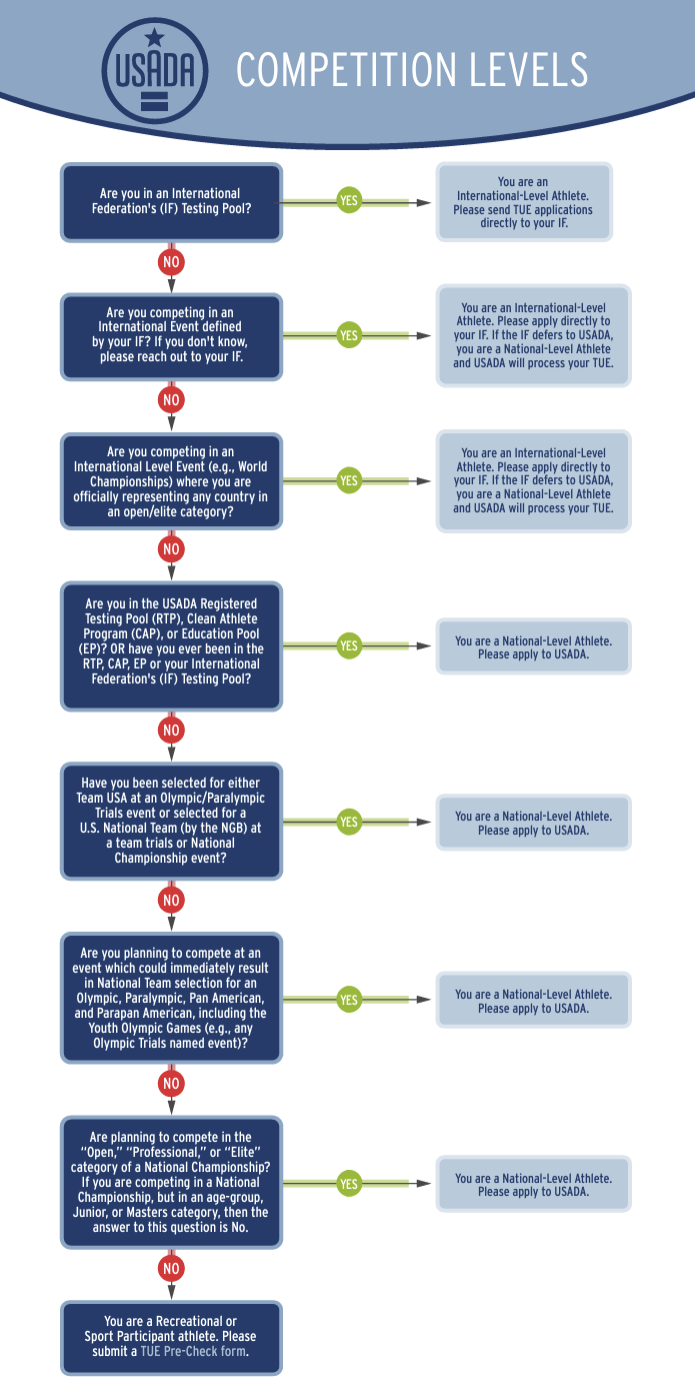UPDATED: January 23, 2024
Knowing your competitive level in an anti-doping context can be confusing at times. However, it is important to know since your responsibilities regarding Therapeutic Use Exemptions (TUEs) can be affected. Your competitive level, which is subject to change, may help you determine whether you need to file a TUE or if you should fill out a TUE Pre-Check Form. Below you’ll find four things you need to know about competition levels to help you navigate the TUE process.
1. What are the different competition levels of athletes?

International-Level Athlete: Athletes who compete in sport at the international level, as
defined by each International Federation.
National-Level Athlete: Athletes who compete in sport at the national level, as defined by
each National Anti-Doping Organization. Athletes who were in the Registered Testing Pool (RTP), Clean Athlete Program (CAP), or Education Pool (EP) at some point in their careers but are no longer in those programs are also considered National-Level Athletes.
Recreational Athlete:
Any athlete subject to the USADA Protocol for Olympic and Paralympic Movement Testing who:
- is not an International-Level Athlete or an athlete entered into an International Event*,
- is not a National-Level Athlete,
- is not a Sport Participant,
- and over whom USADA has authority to conduct results management in relation to an adverse analytical finding, an atypical finding, or other potential anti-doping rule violation.
Sport Participant:
For the purposes of the USADA TUE Policy, an athlete who:
- is not an International-Level Athlete, National-Level Athlete, or Recreational Athlete;
- is not entered into an International Event in an open/elite category;
- is not a professional athlete by their NGB membership or competition registration;
- has never been in a USADA Whereabouts information pool or Education Pool or a Whereabouts information pool for any other Code-signatory organization;
- and has never:
- represented the United States in an International Event;
- won an international or national championship sanctioned by an international federation and/or national governing body in any category;
- been the recipient of USOPC funding; and
- committed an anti-doping rule violation resulting in a period of ineligibility
2. When does my competitive level change and how do I know it changed?
Your competitive level will change if any of the following situations occur:
- If you have been added to your International Federation’s testing pool or USADA’s Registered Testing Pool (RTP), Clean Athlete Program (CAP), or Education Pool (EP)
- If you are competing in an International Level event (e.g., World Championships) and you are officially representing any country in an open/elite category
- If you have been automatically selected for either Team USA at an Olympic/Paralympic Trials event or automatically selected for a U.S. National Team (by the NGB) at a team trials or National Championship event
Remember, if you are no longer in a Registered Testing Pool (RTP), the Clean Athlete Program (CAP), or the Education Pool (EP), you are still considered a National-Level Athlete and remain subject to anti-doping rules and requirements (e.g., TUEs) in the event you decide to compete in sports or events sanctioned by any WADA Code Signatory in the future.
If you are unsure of your level at any time, please contact the USADA TUE Team at TUE@USADA.org or (719) 785-2045.
3. What levels of athletes should file for a TUE or a TUE Pre-Check?
If the recommended medication is prohibited in competition or at all times, athletes in the Registered Testing Pool (RTP), Clean Athlete Program (CAP), or Education Pool (EP) should submit a TUE application before taking the medication; this allows athletes to meet their medical needs while following the anti-doping rules.
Remember, if you are no longer in a Registered Testing Pool (RTP), the Clean Athlete Program (CAP), or the Education Pool (EP) you are still considered a National-Level Athlete and remain subject to anti-doping rules and requirements (e.g., TUEs) in the event you decide to compete in sports sanctioned by any WADA Code Signatory in the future.
All other athletes, including Recreational and Sport Participant athletes, should submit a TUE Pre-Check Form to USADA to determine if a TUE is required.
4. How do I know if the medication I am taking is permitted?
USADA has created several resources to help athletes determine if substances are prohibited. One of the fastest ways to search the status of a medication and/or ingredient is by using Global Drug Reference Online or Global DRO.com, which provides easily accessible and accurate information on the status of brand-name pharmaceutical products sold in Australia, Canada, Japan, New Zealand, Switzerland, the United Kingdom, and the United States. Some over-the-counter medicinal products are also included in the database.
Global DRO® does not contain information on, or relating to, dietary supplements because they are associated with unreliable manufacturing and evaluation practices. If an athlete can’t find the brand name of their medication on Global DRO, they can also search the active ingredients listed on the medication label, which is often necessary in the case of cold, flu, and other such over-the-counter medications.
More questions?
For questions about specific products, substances, and methods, contact USADA’s Drug Reference Line at drugreference@USADA.org or call (719) 785-2000, option 2. For questions about competition levels and TUEs, contact the USADA TUE Team at TUE@USADA.org or (719) 785-2045.
*If an International Federation refers or defers a TUE application to USADA for an International Event, the athlete’s status will be determined under the USADA TUE Policy without regard to the International Event.
Read more Spirit of Sport blog posts



